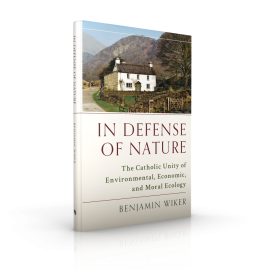By Benjamin Wiker
Benjamin Wiker is a professor of Political Science and Director of Human Life Studies at Franciscan University of Steubenville. He is the author of In Defense of Nature: The Catholic Unity of Environmental, Economic, and Moral Ecology. Learn more about his work on his website, BenjaminWiker.com.

Our culture is at a very unfortunate impasse between the Left and the Right, between Liberals and Conservatives, and it affects Catholics. To boil it down, the Left focuses primarily on ecology, and the Right focuses primarily on morality. This is not a division of labor, but an ongoing battle of misunderstanding, suspicion, and hostility.
If I might provide a general picture of the divide, it looks something like this.
The Left is typically deeply concerned about the natural environment but often considers human nature to be an invasive if not evil presence in an otherwise the paradisal garden of nature. The Right is typically deeply concerned about human nature, but is either indifferent or even hostile to concern for the natural environment. So, while the Left is obsessed with pollution of the natural environment, the Right is obsessed with pollution of the moral environment. The unpleasant and obfuscating result is that each refuses to see the other’s legitimate claims to truth because the other side seems to be tied inextricably to evident error.
Now let’s bring the battle closer to the concerns of Catholics.
The Right looks at the Left and thinks, “All those who are so hyped up about environmentalism are also rabidly pro-abortion and pro-gay marriage, therefore concern about the natural environment must be essentially corrupt too.” The Left looks at the Right and thinks, “All those who are so hyped up about abortion and homosexuality are also rabidly destroying not just the beauty of our natural environment, but poisoning the water and land as well, therefore their concern about “morality” must be essentially corrupt too.”
You can see the problem, I hope.
I’m quite sure that I see the problem nearly every day among orthodox Catholics. Like the Right, many Catholics see that care for the environment is almost invariably coupled with the equally zealous affirmation of moral evils, from gay marriage and transgenderism to abortion. The unhappy result? Catholics dismiss concern for the environment—via guilt by association—as one more manifestation of the culture of death.
What to do? As I tell my students (who often fall into this trap), “I’ve come up for a secret code name for the environment—Creation!”
Do we really think destroying creation is something God smiles upon? Poisoning the water and land? Isn’t creation a manifestation of God’s creative Wisdom? Shouldn’t we want to protect its intrinsic natural beauty? Doesn’t grace build on nature?
The answers to this rhetorical quiz: No. No. Yes. Yes. And Yes.
But what about the moral degradation so often championed by the Left? How does that fit into the Catholic vision?
As I argue in my book In Defense of Nature, Catholics need to understand moral degradation as moral pollution. With that beginning point, we can evangelize the culture in regard to both environmental ecology (code word, the good, beautiful, and wise order of “creation”) and moral ecology (the good, beautiful, and wise moral order of human nature).
The four-step logic of the connection is simple yet profound, and (hopefully) it will restore the proper understanding to Catholics who, in our evangelization, could make significant headway in breaking the impasse between the Left and the Right in our culture.
- Just as there is an order of nature, which is good, wonderful, and beautiful, that we should both respect and protect, so also there is an order of human nature, which is good, wonderful, and beautiful, that we should respect and protect, too.
- When we violate the order of nature in some way, we generally call that “pollution,” meaning by this that we have in some way by our actions damaged nature—whether it is the air, the water, or some particular species
- If human nature is indeed, as its name suggests, part of nature, then we should be able to call violations of the order of human nature, “moral pollution,” and for the very same reason. Meaning, by moral pollution that we have in some way by our actions damaged human nature—whether it is our body, our sexual nature, some other aspect of our moral nature, or our capacity to freely choose what is good.
- Therefore, our understanding of ecology should be expanded to include respect for and protection of both nature and human nature. Our theology should be holistic (i.e., catholic, in the original sense), including both environmental ecology and moral ecology, and whatever connections we find between them.
For Catholics, then, proper concern for the environment is our response of gratitude for the wonder, beauty, and goodness of creation, but that concern includes the wonder, beauty, and goodness of human nature as the pinnacle of creation.
It is sinful to pump toxic chemicals into our streams, and to pump toxic chemicals into our bloodstreams. It is sinful to pollute the air with poisonous gases spewed from factories, and to pollute our sexual nature with poisonous pornography spewed from the internet. The Left and the Right have half-truths. Catholics need to champion the whole truth.
Creation is good—all of it. In Defense of Nature shows how exceedingly well environmental ecology and moral ecology go together in a defense of Creation—all of it.
You Might Also Like

Ecology calls to mind nature “out there”—trees, rivers, oceans, animals, birds, the air, distinct ecosystems. But as Benjamin Wiker argues in his book In Defense of Nature, an obvious part of nature has been mysteriously left out of the environmental movement: our own nature—human nature, especially its essential moral aspects.